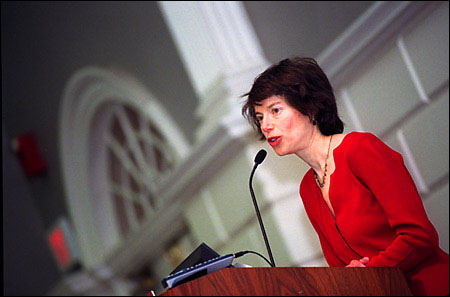Faludi fears feminism trivialized
Author speaks at Radcliffe on ‘gender shock’

And yet the cumulative effect of Faludi’s talk at Radcliffe April 26, part of “Voices of Public Intellectuals Lecture Series: Feminisms Then and Now,” was, if not strident, at least jarring. Titled “Gender Shock,” the talk updated her 1991 bestseller “Backlash: The Undeclared War Against American Women” (a study of the media’s assault on feminism), by looking at ways in which popular culture spins recent events, particularly 9/11, to reinforce traditional gender roles.
A 1981 Harvard graduate who began her journalistic career as “the unofficial feminist reporter on the Harvard Crimson,” Faludi has worked for the New York Times, The Miami Herald, the Atlanta Constitution, and the Wall Street Journal, winning a Pulitzer Prize in 1991. Her most recent book is “Stiffed: The Betrayal of the American Man” (1999).
The American media has always denigrated the feminist movement, Faludi said, quoting newspaper articles from as far back as the 19th century to illustrate the point. And after each feminist resurgence, pundits have been prompt to declare the movement dead. But after 9/11, Faludi began to detect a convergence of advertising, trend journalism, and right-wing politics that seemed bent on shouldering aside the feminist agenda.
Faludi first noticed the shift when journalists started calling her for comments on the theme, “Men are back.”
“My initial response was, have they gone somewhere?”
But as she soon learned, it was specifically “the manly man” who was back in vogue. Conservative speechwriter Peggy Noonan declared that men who exemplified the manly virtues, “who tell everyone else where to go to be safe,” were back in style. And critic Camille Paglia made the point that equality in the workplace feminized men, reduced their ability to fight, and was thus a threat to national security.
Style-setters soon joined the chorus, urging male shoppers “to get in touch with their inner longshoreman” and, for women, announcing “a return to romance, femininity, and sophisticated chic.” One cosmetic company even pictured a model standing at ground zero in Manhattan to advertise lipstick.
“If the mantra were simply about selling lipstick,” Faludi offered, “we could roll our eyes and move on, but there was a political message as well – lay off your demands for independence.”
Faludi also contended that anti-abortion activists used the opportunity to equate the terrorists’ disregard for human life with the destruction of embryos. “The fundamental difference between them and us is that we value life,” said one conservative commentator.
Another writer said that the abuse of prisoners by women in Abu Ghraib was “an outgrowth of feminist culture that champions female barbarism.”
Nor was the anti-feminist reaction to 9/11 confined to the conservative press. On Sept. 30, 2001, the New York Times ran a style piece predicting that single women would no longer be so picky in their choice of mates because, as a result of the terrorist attacks, they were now “alone and scared in their bachelor pads.”
The message behind all these ads and opinion pieces, Faludi asserted, was that “women don’t want equality. They just want to be watched over by men with biceps and a badge.”
Despite feminism’s victories over the past three decades, in certain ways women are worse off now than they were 30 years ago, Faludi said. While 1974 was “a bleak scene for women,” with female representation in leadership positions and in the professions far below what it is today, there was still a sense that “women were busting out” and questioning social institutions in a way that is no longer much in evidence.
“Women were passionate about changing society. This is what jumps out at you when you look at 1974.”
That passion fueled a number of important sex-discrimination cases that resulted in gains for women. And while there were fewer women lawmakers, those who did make it to the House of Representatives – women like Barbara Jordan, Shirley Chisholm, and Bella Abzug – embodied an energy and brashness not often seen today.
“In comparison, we seem relatively complacent – not the next wave of feminism, but the receding trough after the wave has crashed.”
The contrast became clear when Faludi compared entries in the 1972 edition of “Reader’s Guide to Periodical Literature” with those of 2004. The earlier listings were full of “articles about women challenging the status quo in every conceivable field.” Under “feminism” in the 2004 edition, Faludi found “a pathetically tiny handful of articles, and half of them were attacking feminism.”
She found most of the articles trivialized feminine concerns, while those about women in politics were chiefly about women in other countries (the US is 58th among democratic countries in its proportion of female lawmakers). Under “female friendship” she found only one article that championed sisterhood, and that “was unfortunately titled, ‘Two Women Joined by Murder.’”
Meanwhile, Faludi said, the Bush administration has dismantled the Labor Department’s women’s bureau, withheld approval of the morning-after pill, and “launched a ferocious attack on abortion,” among other initiatives.
These struggles rarely surface in the headlines because “social and political issues are instantly stripped of content and used to sell consumer items,” Faludi said. “We are largely mocked and muzzled.”
Nevertheless, she said, there are still courageous women who understand that “getting ahead means nothing if you don’t move ahead in a questioning spirit.”
She urged her audience, especially students, not to be discouraged.
“American feminism has always been a stop-and-go affair. No matter how often feminism has been declared dead, it has always managed to come bounding out of the coffin roaring with life.”




